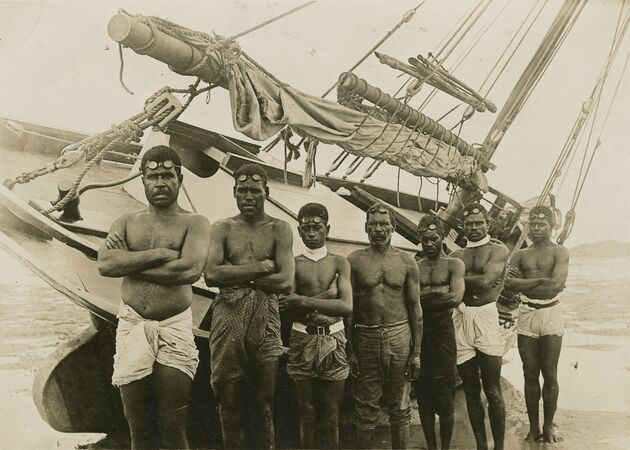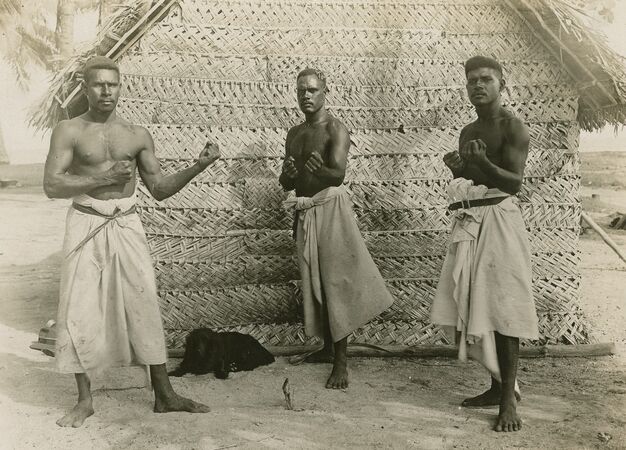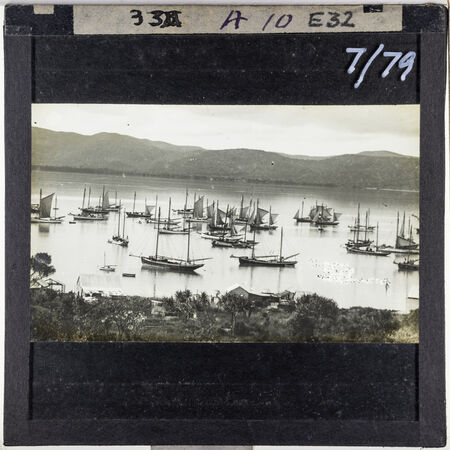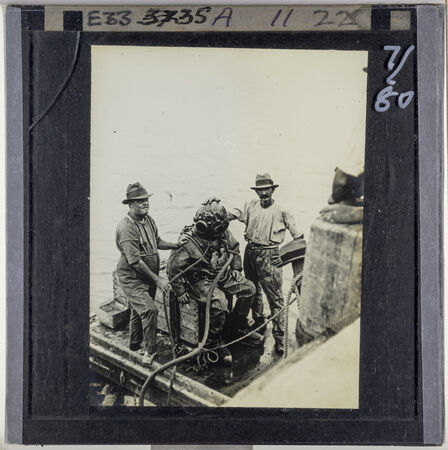Diving Into History: Unearthing Queensland’s Forgotten Seafarers
By Nerelle Nicol, 205 Monica Clare Research Fellow | 18 June 2025
Preserving the untold stories of a Century of Hardships, Triumphs, and Cultural Identity.
Guest blogger: Nerelle Nicol, 2025 Monica Clare Research Fellow.
Picture this: Back in the day, around the 1860s, Thursday Island buzzing with activity. Beche-de-mer and mother-of-pearl were being harvested and exported to lucrative overseas markets. Sounds romantic, right? Well, not so fast.
While the industry thrived, the Aboriginal and Torres Strait Islander workers who helped make it happen were paid a pittance. And the conditions under which they worked were anything but sparkling. At one point the Torres Strait region emerged as the world's leading supplier of mother-of-pearl, a treasure trove of marine riches shipped off to England, Europe, and America primarily for button-making, but these shells symbolised much more than commerce; they were woven into the very fabric of life for coastal Aboriginal and Torres Strait Islander peoples. But what really makes this story shine is the people behind it, the Aboriginal and Torres Strait Islander communities, whose homelands, labour, sweat and perseverance were central to keeping the industry afloat.
Over its one hundred year history generations of Aboriginal and Torres Strait Islander seafarers in Far North Queensland carved their legacy through the tides, they were the mainstay backbone of the pearling and trochus industries in Far North Queensland. Working under the harsh gaze of colonial systems, their labour was not merely survival, it was creation. From their efforts sprang songs, dances, artwork, and oral histories that forged a connection to their ancestors, binding past to present in profound ways.
Yet, the voices of these rugged seafarers are fading fast, without recognition. With each passing year, fewer elders remain to share their firsthand memories of “lugger life” and the remnants of an era that shaped individuals and communities alike. Preserving, honouring and celebrating their stories is no longer optional but necessary.
Queensland’s marine history is fast fading. The time to act is now, before these invaluable stories are lost forever. Through storytelling, exhibitions, and interactive experiences, initiatives like ‘Lugger Bort’ aim to resurrect this legacy. By weaving oral histories, archival records, and creative expressions, we can showcase, acknowledge and celebrate First Nations contributions in ways that resonate deeply with modern audiences.
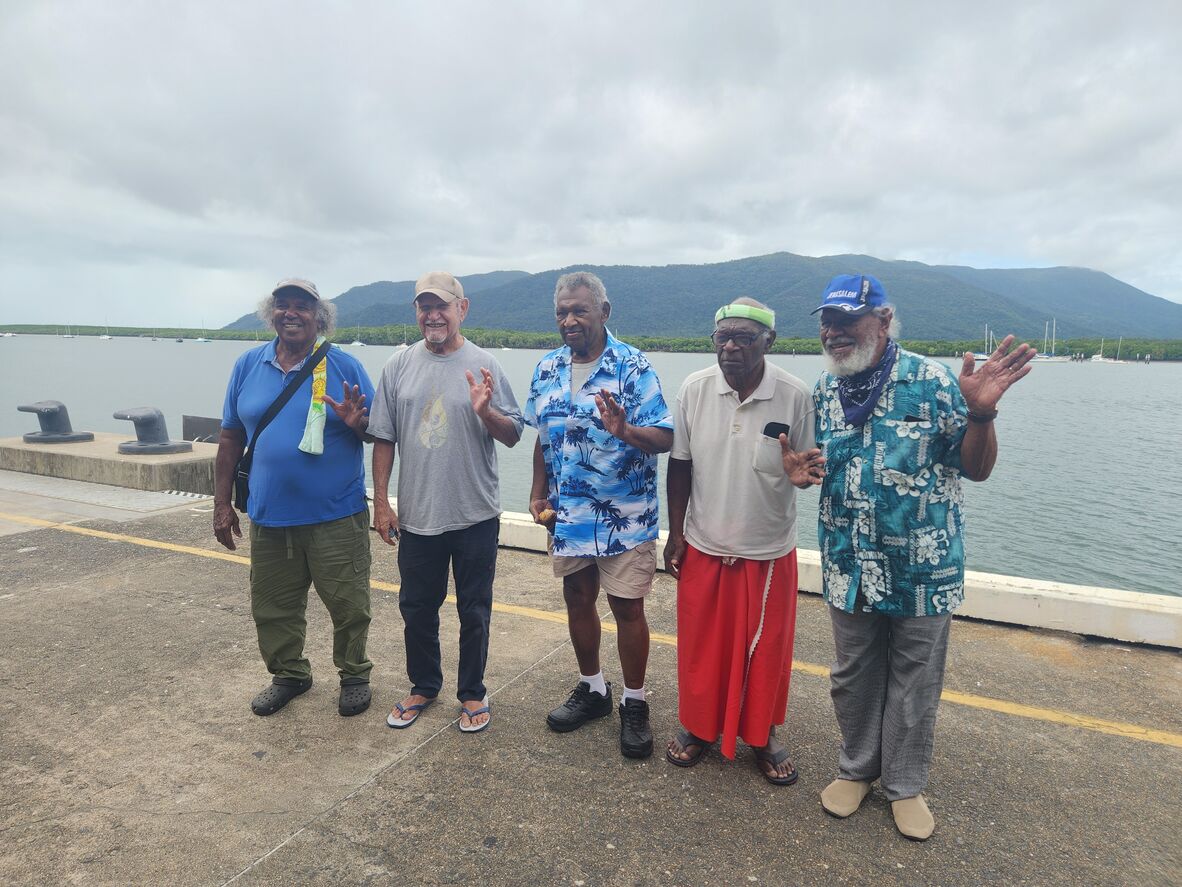
Left to Right: Ronnie Nomoa George Mosby Jimmy Morrison Jeffrey Bob Albert .
‘Lugger Bort’ will take me deep into the collections of State Library, exploring manuscripts, diaries, records, photographs, maps, and ephemera tied to these marine industries in northern Queensland. These materials offer rich context to celebrate the working lives and cultural identities of Aboriginal and Torres Strait Islander seafarers who worked in this industry. Their contributions are more than historical footnotes; they define Queensland’s identity.
This project aligns seamlessly with truth-telling and healing initiatives and the aims of the Monica Clare Research Fellowship. The goal is clear: ensure First Nations voices are at the forefront of the narrative, celebrated as integral threads woven into the fabric of Queensland’s story.
The tide may have turned on Queensland’s pearling days, but the stories of its seafarers endure. Through ‘Lugger Bort,’ we honour their legacy not by merely memorialising it but by creating connections that inspire future generations. From children discovering their heritage and the resilience of their forebears to scholars exploring First Nations communities, these stories are lifelines to history.
Queensland’s marine history isn’t just a chapter in the past, it’s a living testament to resilience, identity, hard labour and the spirit of the people who traversed its waters. Are you ready to dive in and make waves? Together, we can ensure these stories aren’t swallowed by the abyss but shine brightly for years to come.
Let’s celebrate these Aboriginal and Torres Strait Islander seafarers not just for their hard work but for their courage, creativity, and indomitable spirit. The ocean may carry their echoes, but we hold the power to amplify them for generations to come.
Nerelle Nicol
The Monica Clare Research Fellowship is generously supported by The Siganto Foundation.
Read more blogs about Queensland's First Nations history by past Monica Clare Research Fellows.
Watch this video to explore Nerelle's research project, 'Lugger Bort'.
Comments
Your email address will not be published.
We welcome relevant, respectful comments.
